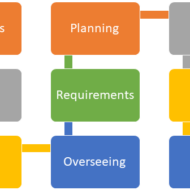Posted by Managementguru in Operations Management, Project Management
on Feb 24th, 2014 | 0 comments

Significance of Operations Management: Business firms need to formulate brilliant operations strategies in order to survive in the market for long. Focus on finance and marketing alone is not sufficient to compete in the global market. The emergence of innovative products and processes from leading companies in different parts of the world is a clear-cut evidence to prove the significance of operations function. Operations management is gaining importance, thanks to public awareness on quality and its applicability in service operations too. Advent of Industrial Revolution: Until the advent of machinery, each and every nation was dependent on agriculture, which was the prime economic activity. After the industrial revolution of the eighteenth century, mechanization in a large scale converted agricultural economy to an industrial economy. Slowly scientific principles were introduced into production activities to make it more systematic and thus “Production Management” evolved. Now service operations have also gained momentum and since the concepts and techniques of production management are applicable to service operations too, it is rightly called as “Operations Management.” Operations management functions at three different levels. Strategic levelTactical levelOperational level Strategic level: At the strategic level, the operations manager must have a long term vision, as to shape up the company’s success in the light of strategic decisions taken, with the approval of the top management. His area of concern would be, New product developmentNew process developmentProduct re-designProcess re-designProcess layoutProduct layoutFacility locationAggregate capacity planningPlanning co-ordination with finance and marketing departments Tactical level: At the tactical level, the operations manager is concerned about the planning and scheduling operations of the desired output. His area of concern would be: Designing a suitable inventory systemPlan for the work force and train them effectivelyQuality control systemMaintenance andReliability assurance system. Operational level: At the operational level, the job of the operations manager is to accomplish the “set targets”, by performing various coordinating and controlling functions. His area of concern would be: Ordering materials at the right timeScheduling productionScheduling workers as per production requirementControlling quality of goods and services producedFollow up of various schedules for proper implementationMaintaining and updating equipment and system reliabilityOn the job skill development of workers, etc. These functions are by no means exhaustive, but only indicative. The process of planning and control operations is not done in water tight compartments, but are interactive and integrative feeding on one another and also aligned in line with the overall corporate objectives. The strategies are evolved for the purpose of efficient utilization of the available resources as well as to predict the changes in the external business environment that calls for suitable action to limit their impact on the goals of the organization, in terms of cost, quality and...

Posted by Managementguru in Economics, International Business
on Feb 16th, 2014 | 0 comments

Economic Growth Strategies A Purview on Economic Growth Strategies for Developing Countries A developing country is one where the per capita income is low relative to that of fully developed countries. In human terms developing countries typically have major population percentage with poor health, low levels of literacy, inadequate dwellings and meager diets. The key to development rests on four fundamental factors namely human resources, natural resources, capital formation and technology. Human resources: A lot of poor countries are forever running hard just to stay in place. Even as a developing nation’s GDP rises, so does its population. So it becomes a mammoth task for such nations to overcome poverty with birth rates so high. Equitable distribution of wealth cannot happen in an economy unless and until it becomes self sufficient. One strategy will be to curb the population, even if such actions run against prevailing religious norms. Strategies for Developement Economic planners in developing countries lay great emphasis on the following strategies of development with regard to human capital: Control disease and improve health and nutrition Improve education, reduce illiteracy and train workers Above all, do not underestimate the importance of human resources. Literate people are knowledgeable and resourceful; their analytical skills help them to weigh the pros and cons of specific social situations that affect their standards of living. Asian countries like India and China with exploding population figures are in a situation to invest their human capital for productive purposes. Pinning Your Way to Profit With Pinterest Natural Resources: Some developing nations with meager endowments of natural resources such as land and minerals have to divide the available resources among the dense population. Perhaps the most valuable of all the resources would be arable land, as most of the people in developing countries employ themselves in farming, which is the primary economic activity. Hence the productive use of land with appropriate conservation, fertilizers and tillage will go- far in increasing a poor nation’s output. More over land ownership patterns are a key to providing farmers with strong incentives to invest in capital land’s yield. When farmers own land, they are more willing to make improvements, such as irrigation systems and undertake appropriate conservation practices. The governments have to think in these lines if their economy is based on agricultural activity: Farmers should be appraised about modern farming techniques and provided with farming equipments and fertilizers at subsidized rates. Note:-nothing should be given as free as freebies make them lethargic and unmotivated. Much of cultivable lands are being destroyed for commercial purposes which have to be checked. Power generation and supply should be copious and uninterrupted as farming, solely is dependent on availability and usage of ground water. Pumping of water is done through jet pumps and electric motors. Budding population can make a marked difference in the field of farming, as it is impossible for a nation to generate white collar jobs for everyone and it definitely elevates the capacity of youth from being mere employees to that of owners. Organic farming has found a place for itself in international market and human capital of developing nations can be employed in research and development of new strains that will facilitate to capture the global market. Capital formation: Rates of productive capital formation are low in developing countries because of deprived income; little can be saved for the future. The financing of growth in poor countries has always been an unstable link in the productive mechanism. Countries should definitely have a balanced and cautious approach when they plan to finance ambitious development programmes as they will be forced to borrow heavily from other developed countries or the World Bank. Technological change and innovations: This is...




